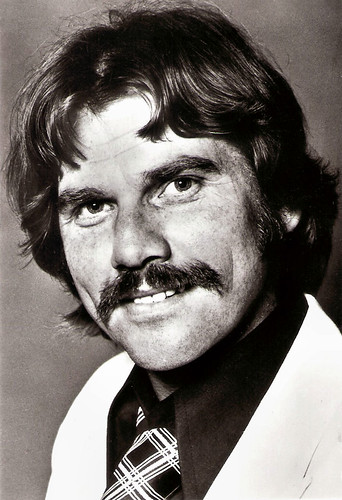
Dutch autograph card.
Started with nothing
Willem Adrianus Nijholt was born in Gombong, Kedoe, the Dutch East Indies (now Indonesia) in 1934. He was the son of Jan Nijholt, a KNIL instructor, and Willemina Sophia Maria Arntz.
At age eight he ended up in a Japanese POW camp, which left a deep scar for the rest of his life. At fourteen, he saw his father again, who was sent to work on the Burma Railway by the Japanese.
After World War II, the family left the Dutch East Indies and settled in Millingen, the birthplace of his mother. Nijholt attended temporarily HBS (Higher Civic School) in Nijmegen, was briefly in the Navy and went to study at the School for dramatic arts in Amsterdam at age 23. His ill mother died in 1959 before she could see him performing on stage.
Nijholt fell in love with the author Gerard Reve, who rejected him, but in 1962 he played a role in Reve’s play 'Commissaris Fennedy' (Commissioner Fennedy) and the two connected. His letters to Reve are published in the book 'Met Niets Begonnen' (Started With Nothing).
He made his screen debut in the TV film De huzaren/The Hussars (Walter van der Kamp, 1960). In 1964 he performed the role of Hoofd Piet (Head Pete) once during the national arrival of Sinterklaas in Hoorn. In 1968 he appeared in the popular satirical TV Show Hadimassa. He became very popular among children with his part in the innovative TV show Oebele (Bram van Erkel, 1968-1972) with Wieteke van Dort. And he made his film debut in Daniel (Erik Terpstra, 1971) with Peter Schaapman.

Dutch card.
The Duch equivalent of the Academy Award
In the 1970s, Willem Nijholt had his definitive breakthrough. On stage, he worked with Wim Sonneveld in a successful cabaret show in 1971.
In 1974 he played Theo Oudijck in the popular TV series De stille kracht/The Silent Force (Walter van der Kamp, 1974), with Pleuni Touw. Their nude scene was a sensation. He also played Ben van Rooyen in the youth series De Kris Pusaka/The Kris Pusaka (Bram van Erkel, 1977).
Nijholt starred in several stage musicals, including 'Wat een planeet' (What a Planet; 1973) and 'Foxtrot' (1977), both written by Annie MG Schmidt. In 1977 he was awarded the Johan Kaartprijs (Johan Kaart Award). In 1981 he played a voice teacher in the play 'Children of a Lesser God'. Later, he was asked to play this role in London too, but he did not accept the offer.
He played roles in Dutch films like the box office hit Ciske de Rat (Guido Pieters, 1984) with Danny de Munk and Willeke van Ammelrooy, and Havinck (Frans Weisz, 1987) in which he played the title character. Chip Douglas at IMDb: “Nijholt, at age 50, was ten years too old. But director Frans Weisz, who screen testing countless leading men opposite (debutant Anne Martien) Lousberg, still wanted Nijholt to read with her, because he had a feeling Willem could bring out the best in Anne Martien. The young actress obviously felt the same way, because she decided there and then that Nijholt was the one to play her father. He ended up winning the coveted 'Golden Calf' award (the Duch equivalent of the Academy Award) for his efforts.”
In 1989 he played the lead role in the short film Alaska, Mike van Diem’s graduation film at the Dutch Film and Television Academy. The film won a Golden Calf and a Student Academy Award. In 1989, Nijholt played the Master of Ceremonies in the musical 'Cabaret' (1989). That year, actor Guido de Moor passed to him the prestigious Paul Steenbergen medal, which he passed in 2002 to actor Pierre Bokma.

Dutch press photo by Jacques Senf b.v., Maasland. Photo: Jorge Fatauros. Willem Nijholt and Linda van Dijck in the play Sukses/Success (Jo Dua, 1982) written by Norman Beim.

Dutch press photo by Jacques Senf b.v., Maasland. Photo: Jorge Fatauros. Willem Nijholt and Linda van Dijck in the play Sukses/Success (Jo Dua, 1982) written by Norman Beim.
The last call
Willem Nijholt played major parts in the acclaimed TV series Bij nader inzien/On closer inspection (Frans Weisz, 1991) and Op afbetaling/In part-payment (Frans Weisz, 1993) with Renée Soutendijk.
He also continued to appear regularly in Dutch films. He played Etienne in the Harry Mulisch adaptation Hoogste Tijd/The Last Call (Frans Weisz, 1995) starring Rijk de Gooijer. He also appeared with Helmut Berger and Udo Kier in Unter den Palmen/Under the palms (Miriam Kruishoop, 1999) and he reunited with Pleuni Touw in De vriendschap/The friendship (Nouchka van Brakel, 2001).
Nijholt appeared in several family films, including Pietje Bell/Peter Bell (Maria Peters, 2002), Pietje Bell 2: De Jacht op de Tsarenkroon/Peter Bell II: The Hunt for the Czar Crown (Maria Peters, 2003) and De Griezelbus/The Horror Bus (Pieter Kuijpers, 2005).
Willem Nijholt enjoyed massive success when he played the controller in the Dutch edition of the stage musical Miss Saigon (1996). Another great musical role was Fagin in Oliver! (1999-2000).
In 2002 he retired from the musical and in 2004 he played his last stage role. In 1999 Willem Nijholt was appointed Officer in the Order of Orange-Nassau. In the television talent quest show Op zoek naar ... (2007-2011; Looking for Evita, Looking for Joseph, Looking for Mary Poppins and Looking for Zorro), Nijholt was the juror. Since 2011 he was a Knight in the Order of the Netherlands Lion. His final screen role was in the TV crime series Penoza II (Diederik Van Rooijen, 2012-2013), starring Monic Hendrickx.
Willem Nijholt sings Koen de Postkoetsboef in the TV show Oebele (ca. 1972). Sorry, no subtitles. Source: Geluidsjager (YouTube).
Wim Sonneveld & Willem Nijholt in the Wim Sonneveld Show (1974). Sorry, no subtitles. Source: NostalgieTheater (YouTube).
Sources: Chip Douglas (IMDb), Een leven lang theater (Dutch), Wikipedia (Dutch), and IMDb.
No comments:
Post a Comment